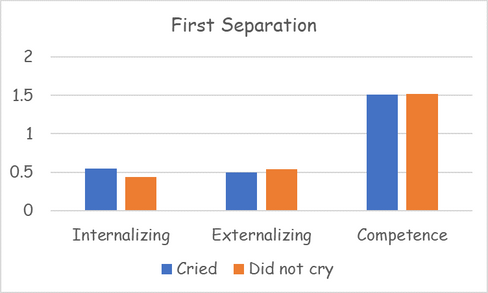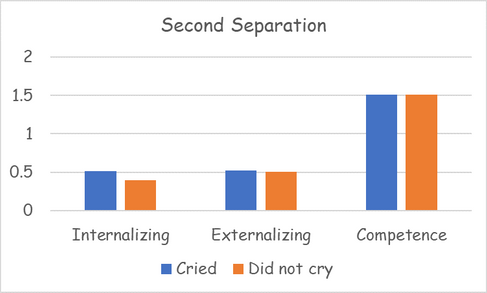Summer 2020 Parent Newsletter
- bearlab
- Sep 1, 2021
- 6 min read
Updated: Sep 10, 2021

We hope all of our BEAR Lab families are doing well in one of the most unique periods of time most of us have ever known. We want to provide some updates about the lab and the studies you have been helping us with, as well as provide some resources for you.
What’s New in the BEAR Lab?
We have had some changes to our graduate student staff, as our most advanced students move onto the next stages in their careers and we welcome new faces. Annie and Keshia are currently completing their “internship,” which is 1-year training experience away from Miami and the final requirement of their degrees. Annie is working at Nationwide Children’s Hospital in Columbus, Ohio, and, after graduation, will take a position at Cincinnati Children’s Hospital. Keshia is on internship at West Virginia University and then will move into a position at Valley Health, also in West Virginia. Randi will be starting her internship at the Oregon Health and Science University. We are very excited for them! This past year, we welcomed Elizabeth to our program. This fall, we will welcome Nicole. We are very excited to have them join the team! Lauren, Natalee, and Sydney will still be with us, and you may hear from them at various points in the next year.
We have now completed our laboratory visits through age 4! We have had over 200 families participate with us, and we couldn’t be happier. We are currently still working through our “kindergarten” phase of the study. Some of you have already participated in this, and we will be in contact with many more of you this summer. As you could probably guess, the pandemic is changing the way we are doing things for awhile. We won’t be having in-person visits to the lab until we can play our games without worrying about COVID-19. That may mean using lots of protective gear, or we may just wait until we can do our procedures normally. In the meantime, we will have several online surveys available for participation in the next few months.
1) COVID-19 study: We are currently getting in touch with families about completing
measures related to how they are dealing with the pandemic. We hope to offer new information about particular challenges for families, but also what predicts resilience in the face of this stressful time. Our plan is to ask families to complete the survey this summer, and have results to report back to you at the end of summer or early fall. We will be asking all families if they want to participate.
2) Kindergarten study: If your child is entering kindergarten this fall, we will get in touch with you about completing an online survey about how you anticipate that will go. You would also complete some measures you may have completed at previous visits. We typically do a visit to the lab in the summer, but we are postponing that for now.
3) School-age follow-up: If you have already completed the kindergarten study (whether it was last year or prior to that), we will get in touch about a follow-up survey, likely at the end of the summer or early in the fall.
If you have any questions about any of the studies, you can always call us (529-2411 – voicemails will be forwarded if we are not in the lab) or email us (BearLab@MiamiOH.edu).
We are very excited to report that we are going to start a NEW STUDY with babies and their mothers! We are partnering with the Development of Mind and Emotions lab at Texas A&M to understand how brain, body, and behavior work together to tell us how babies and their mothers influence each other’s emotions. We have been approved for a grant from the National Institute of Mental Health to fund the study. Some procedures will be similar to what we have done in the TEDDI study, and some will be new. We will likely start lab visits with 1-year-olds in the spring. If you or anyone you know will have a 1-year-old child next year, we would be excited to know! We are particularly hopeful that mothers and infants who experience higher than average fear, worry, or anxiety will join us. We hope this study will offer information that helps us understand post-natal anxiety and developing anxiety in infants, as well as experiences for families who do not experience those things.
TEDDI Study Results
Many of you started participating with us when your child was 1 year-old. If you recall, we did a procedure where you left the room a few times. Many of you asked whether it means something that your child did or did not cry during those separations. Previous studies showed that crying during separations did not predict better or worse outcomes. Now we have some data to back that up! We compared children who did versus did not cry in either the first or second separation on age 4 internalizing behavior (anxiety, depression), externalizing behavior (aggression, impulsivity, behavior problems) and competence (compliance, motivation, relationships). We found no meaningful differences:
Are there any aspects of our study you are curious about? We are happy to take suggestions for results to share in a future newsletter! BEARLab@Miamioh.edu
Helpful Resources for Parents
The pandemic has been a tough time for both kids and parents. There are still questions about what is “okay” for kids to do. We have gathered some recommendations that we hope you find helpful. These recommendations are based on what we now know about how COVID-19 spreads.
The virus spreads through droplets that can be transmitted from one person to another when the person speaks, coughs, sings, breathes, sneezes, etc. Enough droplets have to get to the other person to infect them. So, the most risky situations are those where people are in close proximity to each other and when there is poor air circulation. How long people are in contact also matters. Speaking normally, it would take a little while for enough droplets to transmit to a nearby person. It would take less time for a sneeze because a lot of droplets are sent into the air at once.
There is no single right decision for every family when it comes to various activities. Some experts have suggested that families consider which activities are important enough to face some risk, and skip others.
Can my child have playdates?
The least risky playdates will be outside, with only one other child or as small of a group as possible, and involve activities that do not require close proximity or sharing materials. Inside playdates are a little riskier – it is recommended that kids wear masks and maintain social distance. No matter the situation, good handwashing is key. It also seems better to have a limited number of families you exchange playdates with to reduce possible spreading to a small bubble.
Can we go to the pool?
There is no evidence that COVID-19 transmits through water. If it is going to spread at the pool, it will be because people are in close proximity and spread it to each other. Outdoor pools are less risky than indoor pools because of the air circulation. Either way, maintain social distancing practices. Do not wear masks in the water!
Can we go to the playground?
Yes, playgrounds have largely opened back up. Choose times/locations that are not crowded. Children should wear masks if they have trouble maintaining 6 feet of space between them and other children. Bring your own water bottles and snacks. Wash/sanitize hands before and after.
Although businesses and activities are opening back up (for now), it is still best to limit how much we are out in public. But kids need peer interactions, too, so we just need to use our judgment to do what’s beneficial for our kids and also act in the safest way possible. For all activities, families with members that may be susceptible to sickness or who have regular contact with older adults (60+) should be extra cautious.
Keeping in Touch with the BEAR Lab
We want to stay in contact with you! We would like to be able to contact you for help in future studies or just to tell you what we’re up to, so we would like to have your current address information. If anything has changed please let us know by sending an email to BEARLab@miamioh.edu or give us a call at (513)-529-2411. You can also contact the director, Elizabeth Kiel, at Elizabeth.Kiel@MiamiOH.edu or (513)-529-5430.







Comments